Hyten: Sexual Abuser Or ‘Billy Mitchell Of Space’?
Posted on
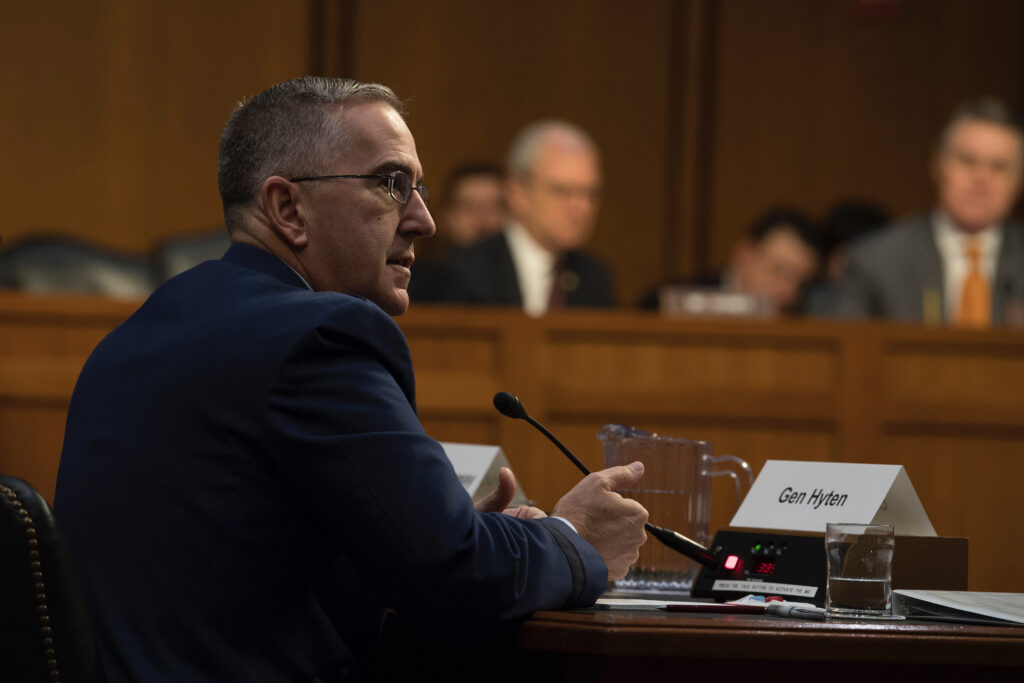
Gen. John Hyten, head of Strategic Command, testifies before Senate Armed Services Committee
WASHINGTON: How the Senate judges Gen. John Hyten and his accuser Tuesday could shape both the fate of President Trump’s proposed Space Force and the way the military handles accusations of sexual assault. Precisely because the stakes are so high and the potential fall-out is so wide, it will be much harder for the Senate to do justice to the individual human beings involved, either Hyten himself or his former subordinate, accuser, and alleged victim, Army Col. Kathryn Spletstoser.
“He’s the Billy Mitchell of space, the real father of the Space Force,” one Pentagon official told Breaking Defense. “Of course, everyone who has a career that has depended on or will depend on Hyten is supporting him. With him gone, there is no one to protect them.”
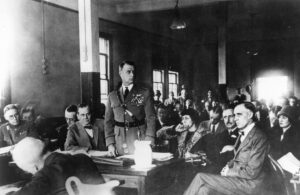
Court-martial of Army Air Service Brig. Gen. Billy Mitchell.
(The SASC nomination hearing to consider Hyten’s assignment as Vice Chairman of the Joint Chiefs of Staff is scheduled to begin at 10 a.m. Tuesday.)
Hyten is not just one of the nation’s 40 active-duty four-star officers, already an elite club with fewer members than a single NFL football team. He is also the operational commander of US space forces (until the new Space Command becomes independent), the leader of the space community, and the advocate-in-chief for space specialists’ careers, in a way no other officer in the community can match. Even the second-most-senior space officer, Gen. John Raymond, “doesn’t command the same respect,” our source said.
Hyten has even managed to earn the respect of the Air Force’s long-dominant “fighter mafia,” who have historically treated the space cadre as second-class citizens, tech geeks at computer monitors who don’t merit a special career path within the Air Force, let alone an independent service — much as the Army Air Service of Mitchell’s day was a marginal branch within the infantry-dominated War Department.
But in another crucial way, Hyten and Mitchell are polar opposites. Mitchell was an outspoken public gadfly, adored by junior aviators but despised by the brass, who eventually court-martialed him for insubordination. Hyten is a successful insider, working quietly and forcefully within the institution to advance the cause of space and cooperating smoothly with both his four-star peers and his civilian masters. Otherwise, he wouldn’t be the nominee for Vice-Chief of the Joint Staff, even in an administration as gleefully iconoclastic as this one.
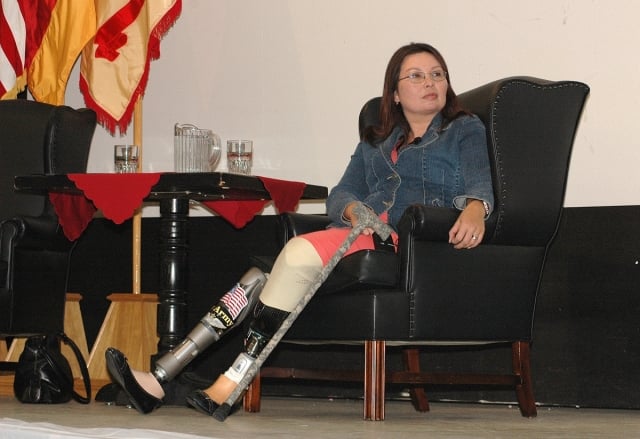
Sen. Tammy Duckworth, a former Army helicopter pilot who lost both legs in Iraq
Mishandling The Case?
Given Hyten’s position and influence, it is no wonder that a number of female senators have deep doubts that Hyten’s accuser was treated fairly or that he was investigated as rigorously as a lesser officer might have been. (Of course, many would argue the military does not have a stellar track record of holding even low-ranking men to account for sexual harassment and assault).
“It’s a really tragic situation, and very emotional,” Sen. Tammy Duckworth told our Defense News colleague Joe Gould last week. Hyten “has served his country well, but there are still unanswered questions that neither he nor his accuser can answer, and that has to do with how DoD [the Department of Defense] handled this case.”
“The military has a clear process,” Duckworth earlier told The Washington Post. “My concern with this case is that they didn’t follow their process….They didn’t suspend his clearance, they didn’t remove him temporarily from his position,” as is the normal procedure during a sexual assault investigation.

There are only 40 four-star generals and admirals currently serving in the US military, just 13 of them in the Air Force. (SOURCE: Defense Manpower Data Center)
Hyten’s position, however, makes his case unavoidably abnormal. The military insists that a suspect’s superior must oversee the investigation and determine whether to file charges, and it has repeatedly rejected proposals to refer them to independent investigators, for fear of undermining commanders’ legal and moral authority and raising questions about their ability to maintain “good order and discipline” in their chain of command. But, as both a four-star general and a Combatant Command chief reporting directly to the Secretary of Defense, Hyten has no uniformed superior, only peers.
The investigation into Spletstoser’s accusations was led by Gen. Mike Holmes, chief of Air Combat Command — a fighter pilot who does not report to Hyten in any way and comes from a very different Air Force community. But since there are only 13 serving four-stars in the entire Air Force, the two men are inevitably well known to one another.
“You have a four-star investigating one of his buddies,” our source said, suggesting a special ombudsman would be a better solution — but that would request a major revision of the Uniform Code of Military Justice.
“That’s way above Air Force level and raises all sorts of UCMJ issues,” a former senior defense official agreed. “I am personally in support of trying to find a better way, but … that’s big DoD stuff.”
Senior military leaders have openly and consistently opposed such a change.
Certainly Duckworth and Sen. Elizabeth Warren think there needs to be fundamental reform. “The severity of the allegations and the sensitivity and seniority of General Hyten’s billet demand that a senior officeholder — not a peer, and certainly not a peer who is junior in grade to Gen. Hyten — should be the convening authority,” the two Democrats wrote Defense Secretary Mark Esper — himself newly confirmed over Warren’s objections — on June 25.
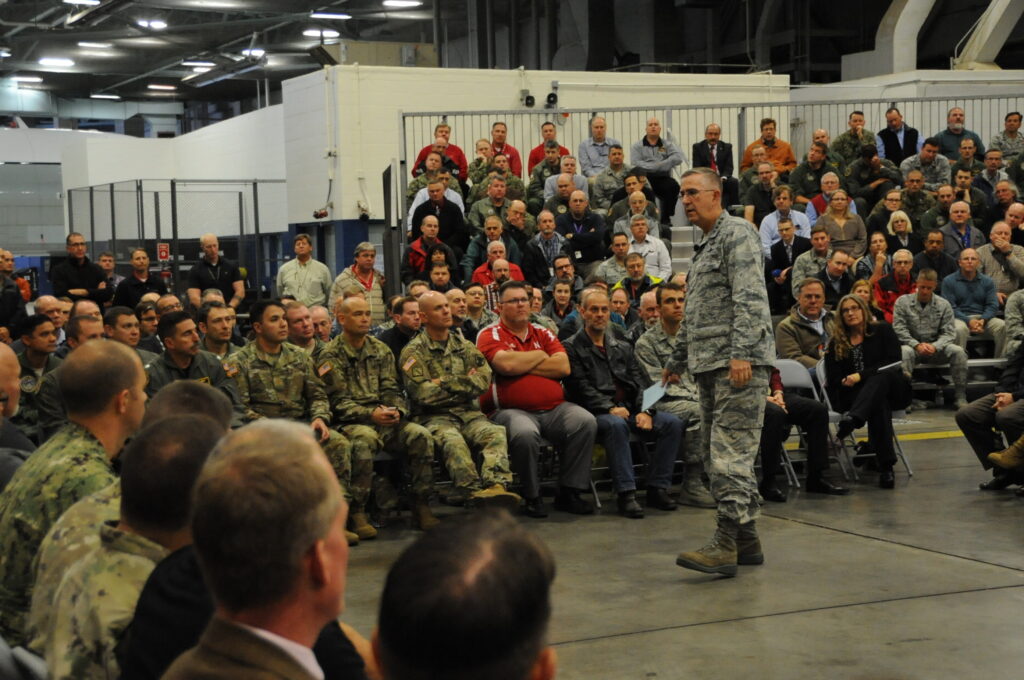
Gen. Hyten speaks to Strategic Command service members and civilians at Offutt Air Force Base, Neb.
Never Alone
At the same time, however, Hyten’s high status and unique job as commander of US nuclear forces may help protect him from the accusations, in one surprising way. He’s almost never alone. While a modern four-star isn’t as relentlessly deprived of privacy as say, King Louis XIV, who was dressed and undressed in the presence of a hundred courtiers, at least some aides and bodyguards are almost always underfoot. That’s especially true for the chief of Strategic Command, who must be available 24-7-365 in case of a nuclear attack. For example, every time North Korea launched a missile test, Hyten was alerted and scrambled to respond if necessary.
That’s why one defense official who supports Hyten told us that perhaps the most puzzling thing in all of Spletstoser’s allegations is that she listed multiple incidents in which she and Hyten were alone together. “He has executive [staff] with him all the time,” the official said. “The opportunity to be alone is nil — there is never a one-on-one. So where would the opportunity have been?”
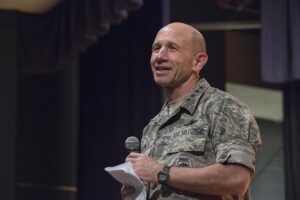
Gen. Mike Holmes
Current and former defense officials have stressed that Holmes’s investigation questioned more than 50 individuals and combed through thousands of emails, only to exonerate Hyten completely. If Holmes had found a shred of evidence supporting the allegations, the pro-Hyten official told us, he would have demanded Hyten be put on leave, fellow four-star or not. Holmes, after all, had previously relieved two senior officers of duty at his own Air Combat Command following conduct investigations — and they weren’t in charge of the nation’s nuclear arsenal.
“If he had turned over a rock and it was weird, he would have done so,” the official said of Holmes. “After all, Hyten is a nuclear commander. That carries with it an extra layer of personal reliability required.”
Meanwhile, though Holmes found no evidence against Hyten, an internal STRATCOM investigation into his accuser found her behavior to be “toxic.” (Spletstoser herself has “acknowledged that she was tough, foulmouthed and often brusque,” as the Post put it). Hyten did not initiate the investigation, formally known as an Article 15-6. But he was the one who fired her afterward, since she worked for him. That meeting apparently went so badly that Spletstoser “had a meltdown” and had to be escorted out of the building by security, several pro-Hyten sources say.
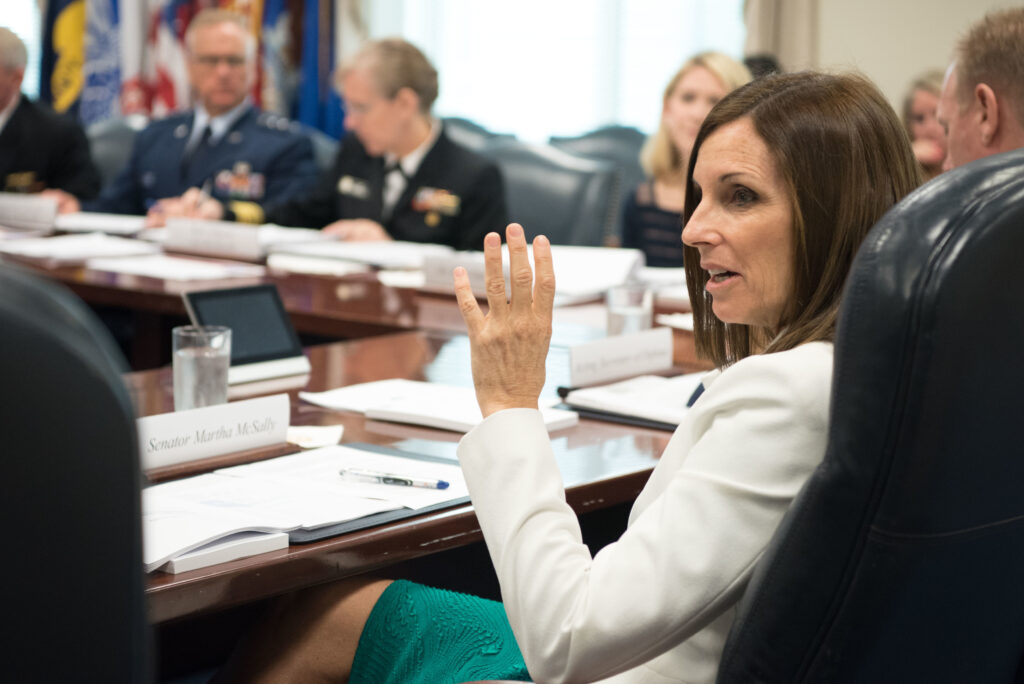
Sen. Martha McSally receives a briefing from the Pentagon’s sexual assault task force.
The Senate Decides
The Senate Armed Services Committee, of course, will have access to those facts and many others. They also spoke directly to Spletstoser herself, who testified behind closed doors last week, as did Hyten. Those confidential sessions may have made up the minds of most, if not all, the committee members already.
A SASC spokesperson would only say that “all past complaints, reports of investigations, etc. have been made available to the committee.”

Sen. James Inhofe
So what are Hyten’s chances? One Hill watcher put the odds of a successful confirmation at only 50/50. Several others gave Hyten better odds, noting that SASC chairman James Inhofe — himself a skeptic of the Space Force — would not have scheduled the hearing if he wasn’t confident he had the votes. But there is another factor that can’t be ignored. “It’s an election year,” the source explained.
The most outspoken senators in public have been two Democrats: Duckworth, a disabled Iraq veteran in whose district Spletstoser lives, and Warren, a longtime crusader on military sexual assault who’s now running for president. But the crucial person to watch is Republican Sen. Martha McSally. A former Air Force officer who openly discussed her own traumatic sexual assault while in uniform, McSally has nevertheless defended the current system in which commanders control investigations. If Hyten can’t convince McSally of his innocence, she has the stature to make his hearing exquisitely painful.
A former defense official with close ties to the Hill was more optimistic, saying that he did not believe Inhofe would have set a date for the hearing at all if he thought Hyten was going to be shot down in flames. Inhofe must have had a conversation with McSally and the other women on the Committee who have spoken out, and carefully counted the likely votes, the source said.
We’ll find out.
Paul McLeary also contributed to this story.
Subscribe to our newsletter
Promotions, new products and sales. Directly to your inbox.
